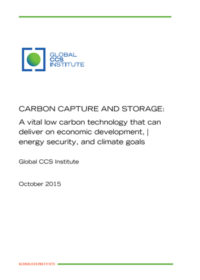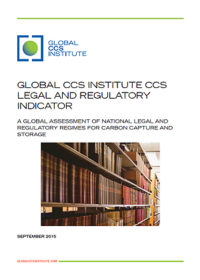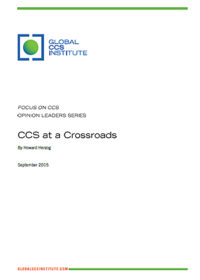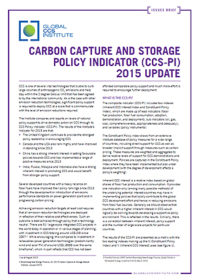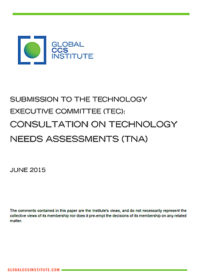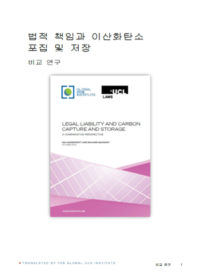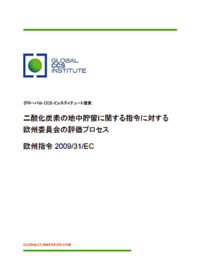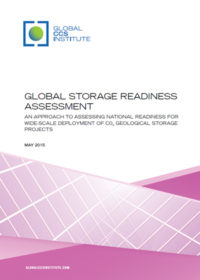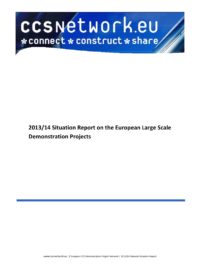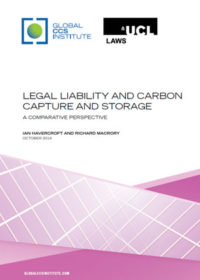Resources
Publications
Our publications, reports and research library hosts over 500 specialist reports and research papers on all topics associated with CCS.
View our Publication Library Disclaimer.
Filter by
Carbon capture and storage: a vital low carbon technology that can deliver on economic development, energy security, and climate goals
2nd November 2015
Topic(s): Carbon capture use and storage (CCUS), Policy law and regulation
The Global CCS Institute’s Senior Advisor Policy & Regulatory, Pamela Tomski, suggests recommendations for policy makers to consider to accelerate the commercial deployment of CCS.
CCS, as a part of a portfolio of low carbon emissions technologies, can deliver on climate goals and in many countries simultaneously meet energy security and sustainable economic development goals.
Disclaimer
The content within the Global CCS Institute Publications, Reports and Research Library is provided for information purposes only. We make every effort and take reasonable care to keep the content of this section up-to-date and error-free. However, we make no claim as to its accuracy, currency or reliability.
Content and material featured within this section of our website includes reports and research published by third parties. The content and material may include opinions and recommendations of third parties that do not reflect those held by the Global CCS Institute.
Global CCS Institute CCS legal and regulatory indicator
29th September 2015
Topic(s): Carbon capture use and storage (CCUS), Policy law and regulation
The Institute’s CCS Legal and Regulatory Indicator represents a detailed examination and assessment of 55 countries’ legal and regulatory frameworks for the technology. The Indicator considers a broad range of legal and regulatory factors, which are likely to be critical to the regulation of CCS, and it is hoped that it will prove a valuable model for tracking progress and opportunities for the development of legal frameworks worldwide.
Disclaimer
The content within the Global CCS Institute Publications, Reports and Research Library is provided for information purposes only. We make every effort and take reasonable care to keep the content of this section up-to-date and error-free. However, we make no claim as to its accuracy, currency or reliability.
Content and material featured within this section of our website includes reports and research published by third parties. The content and material may include opinions and recommendations of third parties that do not reflect those held by the Global CCS Institute.
CCS at a crossroads
23rd September 2015
Topic(s): Carbon capture use and storage (CCUS), Economics, Policy law and regulation
Howard Herzog's article, CCS at a crossroads, is part of an opinion leader’s article series for Focus on CCS. The series features contributions from world leading authorities on carbon capture and storage (CCS), presenting their perspectives on the role for the technology in reducing our carbon dioxide emissions. The series is published by the Global CCS Institute to contribute to the conversation about CCS within the portfolio of options to help tackle climate change.
Howard J. Herzog is a Senior Research Engineer in the MIT Energy Initiative.
Disclaimer
The content within the Global CCS Institute Publications, Reports and Research Library is provided for information purposes only. We make every effort and take reasonable care to keep the content of this section up-to-date and error-free. However, we make no claim as to its accuracy, currency or reliability.
Content and material featured within this section of our website includes reports and research published by third parties. The content and material may include opinions and recommendations of third parties that do not reflect those held by the Global CCS Institute.
Carbon Capture and Storage Policy Indicator (CCS-PI): 2015 update
2nd September 2015
Topic(s): Carbon capture use and storage (CCUS), Carbon markets, Domestic policy, Economics, Policy law and regulation
The Institute has developed an analytical framework to derive a composite indicator that compares levels of national policy support to drive domestic action on CCS.
This 2015 update of the CCS Policy Indicator includes some important developments that have occurred in several major countries since it was last published in 2013.
Disclaimer
The content within the Global CCS Institute Publications, Reports and Research Library is provided for information purposes only. We make every effort and take reasonable care to keep the content of this section up-to-date and error-free. However, we make no claim as to its accuracy, currency or reliability.
Content and material featured within this section of our website includes reports and research published by third parties. The content and material may include opinions and recommendations of third parties that do not reflect those held by the Global CCS Institute.
Submission to the Technology Executive Committee (TEC): consultation on technology needs assessments (TNA)
29th June 2015
Topic(s): Carbon capture use and storage (CCUS), Policy law and regulation
The Institute's submission to the United Nations Framework Convention on Climate Change (UNFCCC) Secretariat, in response to the Technology Executive Committee's (TEC) taskforce on Technology Needs Assessments (TNAs).
Disclaimer
The content within the Global CCS Institute Publications, Reports and Research Library is provided for information purposes only. We make every effort and take reasonable care to keep the content of this section up-to-date and error-free. However, we make no claim as to its accuracy, currency or reliability.
Content and material featured within this section of our website includes reports and research published by third parties. The content and material may include opinions and recommendations of third parties that do not reflect those held by the Global CCS Institute.
법적 책임과 이산화탄소 포집 및 저장 . 비교 연구
15th June 2015
Topic(s): Carbon capture use and storage (CCUS), Policy law and regulation
보고서는 탄소 포집 및 저장(이하 CCS)과 관련된 운영 책임에 관한 법적 문제들을 다루고 있다. CCS 활동은 발전소 또는 공장에서의 CO2 포집, 파이프, 해상 및 육상 수송을 통한 농축 상태의 CO2수송, 내륙 및 바다의 깊은 지하에 CO2 장기저장이라는 세 가지 별개의 활동을 포함한다. 포집과 수송에 관련된 책임 문제는 다른 산업 활동에 관련된 문제들과 크게 다르지 않을 것으로 보인다. 그리고 적용되는 법이 상당부분 중복됨에도 불구하고, CO2 저장은 적절한 책임 제도를 고안하는데 상당한 과제를 만들어낼 수 있고CO2 저장기간이 매우 길며 사용하는 기술이 아직도 상대적으로 새로운 기술이기 때문에 이 보고서는 저장에 초점을 맞추고 있다.
Korean translation of Legal liability and carbon capture and storage: a comparative perspective .
Disclaimer
The content within the Global CCS Institute Publications, Reports and Research Library is provided for information purposes only. We make every effort and take reasonable care to keep the content of this section up-to-date and error-free. However, we make no claim as to its accuracy, currency or reliability.
Content and material featured within this section of our website includes reports and research published by third parties. The content and material may include opinions and recommendations of third parties that do not reflect those held by the Global CCS Institute.
グローバルCCSインスティテュート提言: 二酸化炭素の地中貯留に関する指令に対する欧州委員会の評価プロセス欧州指令2009/31/EC
11th June 2015
Topic(s): Carbon capture use and storage (CCUS), Policy law and regulation
インスティテュートは、欧州委員会(EC)から利害関係者への要求、すなわちCO2の地中貯留に関するEU指令2009/31/EC(CCS指令)の施行の見直し作業に参加し、欧州におけるCCSの普及と実現政策の状況を評価する要請に応じ本提言を作成した。本提言では「CCS指令の適用に関する考察」、「欧州のCCSの普及と実現政策に関する考察 」、「CCS指令の実施以降のCCS技術の技術的パフォーマンスとコストの進捗に関する考察」について述べている。
Japanese translation of Global CCS Institute submission to: the European Commission’s evaluation process of the Directive on the Geological Storage of Carbon Dioxide Directive 2009/31/EC.
Disclaimer
The content within the Global CCS Institute Publications, Reports and Research Library is provided for information purposes only. We make every effort and take reasonable care to keep the content of this section up-to-date and error-free. However, we make no claim as to its accuracy, currency or reliability.
Content and material featured within this section of our website includes reports and research published by third parties. The content and material may include opinions and recommendations of third parties that do not reflect those held by the Global CCS Institute.
Global storage readiness assessment: an approach to assessing national readiness for wide-scale deployment of CO2 geological storage projects
29th May 2015
Topic(s): Carbon capture use and storage (CCUS), CO2 storage, Policy law and regulation
Lead Author Christopher P Consoli presents this methodology that assesses any given nation’s readiness for large-scale carbon dioxide (CO2) geological storage projects, as part of the wide-scale deployment of carbon capture and storage (CCS) projects. The Global CCS Institute’s assessment method enables a consistent and repeatable framework using a weighted set of criteria for transparency and accountability that can be updated as necessary to revise assessments and to include new nations.
This storage assessment complements the CCS Policy Indicator (CCS-PI) previously published by the Global CCS Institute in 2013 to compare levels of national policy support for CCS. Together, these two assessments work to highlight the global progression of CCS. This assessment is a living document designed to reflect the evolution of CCS and will be updated regularly.
Disclaimer
The content within the Global CCS Institute Publications, Reports and Research Library is provided for information purposes only. We make every effort and take reasonable care to keep the content of this section up-to-date and error-free. However, we make no claim as to its accuracy, currency or reliability.
Content and material featured within this section of our website includes reports and research published by third parties. The content and material may include opinions and recommendations of third parties that do not reflect those held by the Global CCS Institute.
CCS in the Baltic Sea Region – Bastor 2. Work package 4: legal and fiscal aspects
14th April 2015
Topic(s): Carbon capture use and storage (CCUS), Policy law and regulation
This report provides an analysis of the current and suggested legal framework that could regulate CCS activities in Sweden and the wider Baltic Sea region. The evolution of a well-functioning legal framework for regional CCS operations is expected to be time consuming, with the early identification of potential hurdles critical to all stakeholders.
David Langlet was commissioned by Elforsk to analyse legal and fiscal aspects of CCS in the Baltic Sea region. The study was carried out jointly with Nils Rydberg who brought expertise on the CCS value chain and its actors. This report is part of the project Bastor2 (Baltic Storage of CO2), with the overriding objective to assess the opportunities and conditions for CO2 sequestration in the Baltic Sea Area. The project, which ran from June 2012 through September 2014, was financed by the Swedish Energy Agency, the Global CCS Institute and a number of Swedish industrial and energy companies.
Disclaimer
The content within the Global CCS Institute Publications, Reports and Research Library is provided for information purposes only. We make every effort and take reasonable care to keep the content of this section up-to-date and error-free. However, we make no claim as to its accuracy, currency or reliability.
Content and material featured within this section of our website includes reports and research published by third parties. The content and material may include opinions and recommendations of third parties that do not reflect those held by the Global CCS Institute.
Global CCS Institute submission to: the European Commission’s consultation on revision of the EU Emissions Trading System (EU ETS) Directive
31st March 2015
Topic(s): Carbon capture use and storage (CCUS), Policy law and regulation
The European Council has concluded that 400 million allowances in the period 2021 to 2030 should be dedicated under the EU Emissions Trading Scheme (EU ETS) to setting up an innovation fund to support demonstration projects of carbon capture and storage (CCS), in addition to other low carbon technologies.
To make this fund operational, a legal basis has to be created in the EU ETS Directive. In this submission the Global CCS Institute sets out its views on the innovation fund in response to the European Commission’s request for stakeholders to participate in the public consultation on the revision of the ETS Directive (established by Directive 2003/87/EC).
Disclaimer
The content within the Global CCS Institute Publications, Reports and Research Library is provided for information purposes only. We make every effort and take reasonable care to keep the content of this section up-to-date and error-free. However, we make no claim as to its accuracy, currency or reliability.
Content and material featured within this section of our website includes reports and research published by third parties. The content and material may include opinions and recommendations of third parties that do not reflect those held by the Global CCS Institute.
Situation report 2013/14: European large scale demonstration projects
19th November 2014
Topic(s): Carbon capture use and storage (CCUS), Engineering and project delivery, Permitting, Policy law and regulation
This second edition of the European CCS Demonstration Project Network: Situation Report 2013/14 includes the findings related to the participating projects from both the knowledge sharing events, presentations, and the internal survey conducted via the Information and Experience Gathering (IEG) questionnaire. The report covers progress made by the projects in capture, transport, storage, regulatory development, public engagement and knowledge sharing within and beyond the Network.
Little has changed from previous reporting for the projects in terms of planning and following timelines. Almost all of them have experienced delays with various permits and with reaching a final investment decision (FID). In 2013, two projects, Porto Tolle and Compostilla received a negative FID. Ciuden, the academic partner of Compostilla project, remains however with collaborative status in the Network. The current timeline for the ROAD project suggests that they could be operating and injecting CO2 by 2017. For Don Valley project this is planned for 2018.
The Network is composed of one oxyfuel power project (former Compostilla), one IGCC power project which may also include gas oxyfuel technology (Don Valley), one post-combustion power project (ROAD) and a gas processing project (Sleipner). Sleipner is the only project currently in operation. All will capture over 1 million tonnes of CO2 per annum, at a capture rate of over 90%. SOx and NOx are quoted by the projects as the most common and expected impurities in the slip stream gas.
Disclaimer
The content within the Global CCS Institute Publications, Reports and Research Library is provided for information purposes only. We make every effort and take reasonable care to keep the content of this section up-to-date and error-free. However, we make no claim as to its accuracy, currency or reliability.
Content and material featured within this section of our website includes reports and research published by third parties. The content and material may include opinions and recommendations of third parties that do not reflect those held by the Global CCS Institute.
Legal liability and carbon capture and storage: a comparative perspective
1st October 2014
Topic(s): Carbon capture use and storage (CCUS), CO2 storage, Liability, Policy law and regulation
Legal liability issues remain critically important for the commercial development of carbon capture and storage (CCS). This co-authored report by Global CCS Institute and University College London largely focusses on the storage aspect of the CCS process. Storage is where the most distinctive liability challenges lie, largely due to the long time-scales involved.
The authors address three types of legal liability:
- Civil liability where third parties who have suffered harm seek compensation or a court order.
- Administrative liability where authorities are given powers to serve some form of enforcement or clean-up order.
- Emissions trading liability where an emissions trading regime provides a benefit for CO2 storage and an accounting mechanism is in place should there be subsequent leakage.
Disclaimer
The content within the Global CCS Institute Publications, Reports and Research Library is provided for information purposes only. We make every effort and take reasonable care to keep the content of this section up-to-date and error-free. However, we make no claim as to its accuracy, currency or reliability.
Content and material featured within this section of our website includes reports and research published by third parties. The content and material may include opinions and recommendations of third parties that do not reflect those held by the Global CCS Institute.
